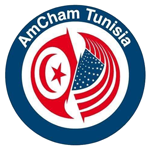The American Chamber of Commerce in Tunisia (AmCham Tunisia) organized in collaboration with Philip Morris International on Thursday, October 25, 2018 at Le Paris Hotel Berges du Lac a conference under the theme “fight against illegal trade”. During this event, the results of the Illicit Trade Environment Index were presented. The two experts Stefano Betti from Tracit and Chris Clague from the Economist Intelligence Unit (EIU), presented the data on Tunisia and proposed recommendations to combat the phenomenon of illegal trade in Tunisia. Were present in this event AmCham Board members, members & friends.
Tracit commissioned EIU to produce the Global Illicit Trade Environment Index, which assesses the structural capacity of 84 countries to effectively protect themselves against illicit trade, highlighting strengths and weaknesses 25 political, legal, regulatory, economic, commercial, institutional and cultural indicators. The results are intended to help policymakers better understand the regulatory environment and economic circumstances that promote illicit trade, to identify areas that deserve greater attention and to formulate strategies to address the serious threats posed by unlawful trade, stress the two keynote speakers.
According to this index, Tunisia ranks 53rd, with a score of 56 points out of 100. The same report establishes that the informal economy in Tunisia represents 35.5% of the Tunisian GDP, with 1.1 million people who work there, 32% of the active population. 30% of the products consumed in Tunisia would come from this economy (fuel, tobacco, alcohol, etc.).
Differences in levels of government subsidies on both sides of the border, as well as different tax regimes, have been the main drivers of this informal trade. This results in a significant loss of public revenue for the state, in addition to unfair competition in the formal sector, as legitimate businesses are no longer able to compete with smugglers. These products can have a detrimental impact on the health of the consumer. In addition, all this discourages foreign investment coming to settle in the country. Worse still, and given its links to organized crime, illicit trade can create greater risks to national and regional security.
They believe that Tunisia must continue to make efforts to combat illegal trade until the origin of the phenomenon is targeted and the problem solved. They are aware that there are no miracle recipes that it is not easy to find the right solutions and especially to implement them, especially since the economic systems based on smuggling constitute for certain cross-border regions, the main source of employment.
Illicit trade is a scourge that plagues nations. Tunisia is no exception, and given the particular conditions it faces, it must multiply efforts especially with the risks it incurs.

